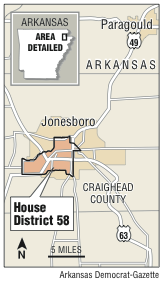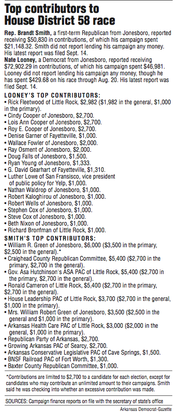When talking to voters in his House district in Jonesboro, Rep. Brandt Smith says the first question he is likely to be asked is where he stands on abortion.
The first-term Republican says his pro-life positions -- he supports abortion only to save the life of the mother -- as well his opposition to same-sex marriage and support of gun rights helped get him elected to the state Legislature.
Smith faces a re-election challenge this year from Jonesboro attorney Nate Looney, a Democrat seeking his first public office. Looney said he supports pre-kindergarten and higher-education funding, Medicaid expansion and campaign-finance overhauls -- positions that he says are still popular in a district that leaned Republican in 2014.
House District 58, which includes parts of Jonesboro and the Arkansas State University campus, elected Smith, an associate professor for the online American Military University, by a 5.2 percentage-point margin over then-Rep. Harold Copenhaver in 2014. Copenhaver was a Democrat.
The state representative job pays a salary of $39,400 a year, plus per diem and mileage expenses for attending legislative meetings. The term for a representative is two years.
During a recent interview at the state Capitol, Smith, 57, said: "I'm opposed to same-sex marriage, and I think we live in a traditional, values-driven district, and the thing is my opponent has not come out and defined himself in any way on any of those issues."
In an interview at a Little Rock coffeehouse, Looney, 29, said he is personally opposed to abortion and would not support a law to ban gay marriage, or "actively discriminate against any segment of the population." He said he supports "reasonable" checks on gun rights, including a ban on weapons on college campuses.
Social issues such as gay marriage and abortion rights have largely left the realm of state government, Looney said, due to U.S. Supreme Court decisions.
"We've seen time and again that legislators pass bills that are facially unconstitutional, and this costs our taxpayers a tremendous amount of money," Looney said, referring to the cost of defending such laws. "If money's tight, we don't need to fight court battles that are not going to go anywhere."
If elected to the Legislature, Looney said he would rather focus on issues where he believes there is common ground between Republicans and Democrats, including investments in education and the continuation of Arkansas' private-option Medicaid expansion, through which the state uses federal money to buy insurance for people earning up to 138 percent of the poverty level.
Smith was one of 30 House lawmakers who voted against renewing the program in April, though it was supported by the Republican leadership and Gov. Asa Hutchinson.
As written, the program will grow Medicaid rolls unsustainably as Arkansas' share of the costs increase to 10 percent in 2020, Smith said. He promised to continue his opposition unless changes are put in place.
"There needs to be some consideration for those that are less fortunate that need insurance coverage," Smith said. "I still think that we cannot sustain it for the long haul, so I think there is going to have to be some heavy lifting done in legislative task forces."
Looney called Smith's position "reckless," saying it would harm two hospitals that are among the Jonesboro region's largest employers, as well as ASU.
Smith declined to say what type of program he would like to see in place of Arkansas Works to provide insurance for poor people.
Looney said he disagreed with a provision sought by Hutchinson through a federal government waiver to charge $19 premiums to private-option recipients who earn above the poverty level.
On another matter, Smith and Looney both expressed interest in supporting Hutchinson's proposal to switch higher-education funding from an enrollment-based formula to one based on outcomes, while adding they wanted to see specifics. Hutchinson's plan seeks to increase the number of Arkansas high school graduates who go on to get higher-education degrees or certificates -- from the current 43 percent to a goal of 60 percent.
Regarding higher-education funding, Smith said colleges and universities "already get the lion's share of state funding." He called for changes, while Looney said schools such as ASU are underfunded.
Questioning where the money would come from for more state programs, Smith accused his opponent of being a "tax-and-spend Democrat," while adding that he would like to cut taxes and reduce the size of state government.
Asked if he would support further income-tax cuts proposed by Hutchinson, Looney said he would wait to see specifics, but noted that state revenue has fallen below forecasts in the first two months of the current fiscal year.
"Those [surpluses] are not guaranteed, and so until our economy is more robust, I think we should proceed with caution," Looney said.
To reduce recidivism and crowding in Arkansas prisons -- which have inmate populations among the fastest growing in the nation -- Smith indicated he would be open to a combined effort to add more prison beds, hire more corrections officers and offer more programs for mentally ill patients.
A legislative task force is reviewing proposals to tackle criminal justice changes during the 2017 legislative session. Smith said he is hesitant to support changing prison sentencing. Looney said he does not support building new prisons, and he argued for programs to reduce crime through education and increased employment.
If re-elected, Smith said he hopes to renew attempts to pass legislation to affirm the authority of American laws over foreign laws in Arkansas courts. Smith sponsored such legislation during the 2015 legislative session -- when it was associated with attempts to ban sharia, or Islamic law, in several states -- but the legislation died in the Senate.
While Smith said he did not know of any examples where foreign laws had been used in Arkansas courts, the issue had come up in Europe, suggesting that the law would be a "preventative measure" aimed at protecting immigrants living in ethnic enclaves, he said.
"Tribal leaders, tribal elders, they don't want to give up authority, but they have to learn to live within our laws," Smith said.
Campaign finances
In reports filed earlier this month, Looney was leading the fundraising race by about $22,000. The Democrat, who helped found a political action committee with several friends while he was a law student in Little Rock, said he decided not to take any money from committees, or PACs, in his campaign.
Looney said one of his chief goals in the Legislature would be to enact campaign-finance overhauls, including eliminating a process through which organizers set up several identical PACs to funnel money to candidates, in order to bypass a law limiting donations to $2,700 per candidate, per election.
"People are doing the same thing [corporate] entities used to do, and it makes it difficult for people to trace where the money is coming from, and it allows people to give more than their fair share," Looney said.
Smith said it was hypocritical of Looney to disavow PAC money after previously helping to organize such a committee. He said Looney was looking for a cause to help his campaign.
Campaign-finance reports show that half of Smith's largest donors are PACs.
Metro on 10/07/2016

